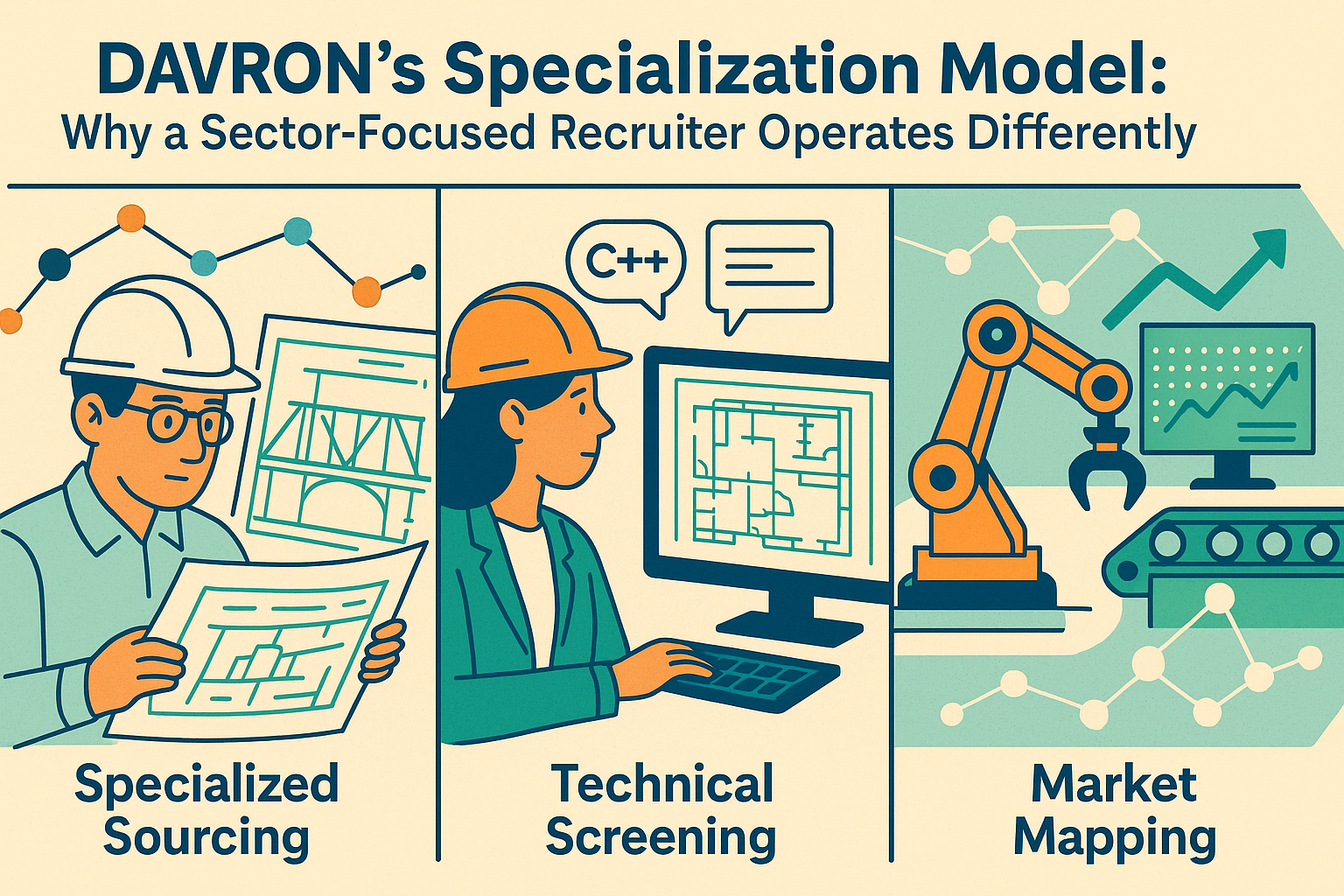In a hiring landscape defined by speed, precision, and technical complexity, a sector-focused recruitment model doesn’t just offer a different approach—it creates a fundamentally different hiring engine. DAVRON’s Specialization Model illustrates how industry-specific focus reshapes sourcing, screening, and talent intelligence, resulting in a recruitment strategy tailored to the realities of niche technical markets.
This article breaks down the model in clear, neutral terms—no value judgments, no promotional language—just an explanation of how a specialized recruiter functions and why the operational structure differs from generalist staffing firms.
Specialized Sourcing Built for Hard-to-Find Talent
A sector-focused recruiter builds and maintains sourcing pipelines around specific industries—engineering, architecture, construction, manufacturing, and related technical fields.
This sourcing approach typically includes:
- Industry-aligned talent pools: Rather than broad databases, recruiters cultivate networks of professionals within defined specialties, job families, and disciplines.
- Role-specific search patterns: Boolean logic, competitive targeting, and database queries are crafted using the terminology and structure of the given sector.
- Proactive pipeline development: Candidate pipelines are maintained continuously based on recurring occupational demand within an industry.
The sourcing strategy functions as a living ecosystem, shaped around how talent actually moves within a particular technical market.
Technical Screening Using Industry Language
A defining component of DAVRON’s model is the use of industry-specific language in screening conversations. Recruiters do not simply match keyword lists—they assess candidates using terminology, tools, workflows, and regulatory concepts native to the sector.
This typically includes:
- Understanding of software systems, technical deliverables, and certification requirements that vary by industry.
- Ability to evaluate project experience, such as design phases in architecture or lifecycle stages in engineering.
- Familiarity with industry standards, enabling meaningful dialogue with candidates about past work and expectations in new roles.
The result is a screening process that aligns closely with how employers evaluate technical capability.
Market Mapping and Competitive Insight
Sector-focused recruitment relies heavily on market mapping—the process of examining where talent exists in relation to industries, company types, geographic regions, and in-demand skill sets.
Market mapping in this model often includes:
- Company-to-role structures: Understanding which organizations employ specific job titles or skill clusters.
- Compensation and role trends: Tracking shifts in market expectations, salary ranges, and job function evolution.
- Geographic talent concentrations: Identifying where niche skill sets are most prevalent and how relocation or remote policies influence supply.
- Competitor intelligence: Observing hiring activity, organizational changes, and emerging technical requirements within sectors.
This intelligence informs candidate targeting, job requirement alignment, and strategic recommendations for employers.
Why the Model Operates Differently
The combination of specialized sourcing, technical screening, and industry-informed market analysis creates a recruitment model that functions with:
- Deeper alignment to technical roles
- More targeted candidate pools
- Greater insight into market realities
- Faster identification of qualified talent
Generalist firms may offer broader reach, but a sector-focused model is built around depth—structured specifically for industries where technical fluency and market intelligence materially affect hiring outcomes.
DAVRON’s Specialization Model operates differently because it is built around the realities of technical industries. Specialized sourcing targets niche talent pools, technical screening uses the language and tools of the sector, and market mapping provides insight into where talent exists and how it moves. These components create a recruitment approach structured for precision in specialized technical fields.
FAQ
What industries typically benefit from a sector-focused recruiter?
Engineering, architecture, construction, manufacturing, and advanced technical fields where skill sets are niche and role requirements are highly specific.
Is specialized recruitment only for senior roles?
No. The model applies across levels—entry through executive—because the specialization lies in industry knowledge, not job seniority.
How does market mapping differ from general labor market research?
Market mapping focuses on specific job families within defined industries, identifying where talent exists and how it aligns with technical hiring needs.

